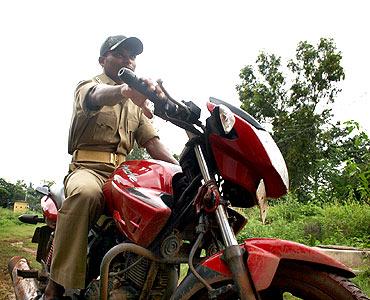
As a Naxal area commander in violence-hit Keonjhar district in Odisha, Udam Sundhi once aimed to overthrow the Indian government. Today, as a home guard, he tries to preserve law and order in the very same area he once terrorised.
Rediff.com's Toral Varia and Photographer Reuben N V bring you the fascinating story of this former Left-wing ultra.
Read part 1 of this series: Disillusioned, Naxals give up violence in Odisha
Read part 2 of this series: Why Maoist cadres in Odisha are laying down their arms
From mid-2007 to early 2010, Suresh alias Hati alias Udam Sundhi was listed as a top-ranking 'undercover worker' in the records of most wanted Maoists with the Keonjhar district police headquarters in Odisha. What the police dossier meant was that he was a dreaded 'area commander'.
Attached to the Simlipal squad of the Kalinga Nagar division of the banned Communist Party of India-Maoist, Sundhi was in charge of the squad that was responsible for the violence in Mayurbhanj and Keonjhar. He was wanted for his role in as many as seven brutal acts of violence, including the February 2008 attacks on the police armoury and police establishments in Nayagarh district which left 13 police personnel dead, the 2009 attack on the Simlipal tiger reserve in which the Maoists blew up three forest range offices and set ablaze two vehicles.
However, on March 9, 2010, Sundhi gave up arms and surrendered before Ashish Singh, superintendent of police for Keonjhar district. On April 12 that year, Sundhi married his comrade in arms Malti, who had surrendered along with him. Today Sundhi is the father of a two-year-old and a proud home guard with the Keonjhar district, earning a monthly salary of Rs 4,500.
It's been over a year since Sundhi surrendered but his life has been under constant threat from Maoists, a reason why the police has accommodated him and his family in one of the quarters inside the armed reserve police grounds in Keonjhar, which he shares with six other surrendered Maoists.
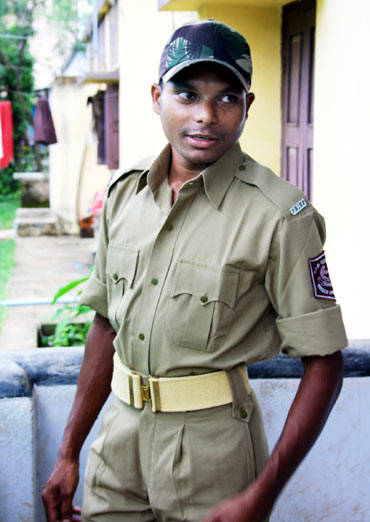
In 2007, when Sundhi was all of 20 years old, he was spotted by some gun-wielding cadres of the Kalinga Nagar division of the CPI-Maoist who had come to Rebana village in Keonjhar district's Simlipal block. The gun-toting group asked him to show them around the villages in the neighbouring areas. With no idea that the expedition would change the course of his life and with little occupation at hand, Sundhi readily took the group on a tour.
On the pretext of exploring the area, Sundhi was lured deep into the jungles where he heard his first-ever speech propagating the Naxal ideology. Prabhakar alias Bhaskar Patra, member of the Kalinga Nagar area committee who was heading the small group, took Sundhi to the secretary of Kalinga Nagar divisional committee Sushil alias Basant in the interiors of the jungles.
According to Sundhi, "Sushil inspired me with his speech on how the government, police, society, and zamindars, all have a capitalist mentality. He told me that the CPI-Maoist is a party for the, by and of the poor which was committed to the upliftment of the tribals. He explained how the the zamindars and thekedars only suppress the poor by looting them. When I heard him speak I realised that he was reflecting the situation in my village exactly. I was from the oppressed section of society and back then I was very impressed by the promise and the prospect of working for the party. So I immediately decided to join them."
Sundhi came from a poor family of farmers in Keonjhar's Rebana block. With five siblings, Sundhi and his family barely managed to make ends meet. Conditions in his village block were no better. "Lacking proper irrigation facilities and having bad roads, and with almost no development in the region, zamindars of the area had a field day. They used to harass almost all the families," says Sundhi.
But, Sundhi's family was against his decision of joining the rebels. "My family was harassed and stressed. They lived in constant worry that I have taken to the wrong path," recalls Sundhi.
He finally left home with only some clothes and walked through the forests to reach the party's base in the Badajal jungles. "On reaching the base we were welcomed with greetings of lal salaam. Other party members came forward and introduced themselves to us," Sundhi recalls.
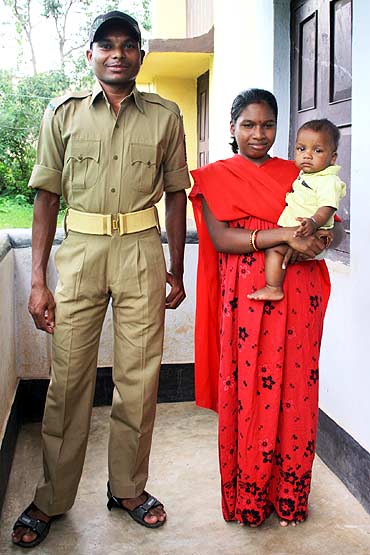
After a couple of days of orientation, Sundhi was formally inducted into the party. He was given new clothes, a new identity and a new name -- Udam, the name with which he was known for the next three years.
"It's a tradition in the party to change the name of the recruit. The main reason in doing so is that if we are identified, or if any case is registered against us, our real identity remains intact and that helps us when the need arises," explains Sundhi.
Because he was a fresh recruit and was not on the radar of the anti-Naxal forces, he was initially given organisational responsibilities. His new role took Sundhi to village schools where he would gather students and propagate the Maoist ideology. "I would lecture groups of students on the chashi andolan (farmers' agitation) and what the Maoist party was doing for daily wage earners and farmers. I used to give them literature and texts to read," he says.
But, gradually, the word started spreading and soon the local police was on Sundhi's trail. "I was doing well for myself within the party. But once I was identified and exposed, I was delegated a different job. I was asked to operate within the camp and not venture out freely," he explains.
While the cadres are not paid any salary, their boarding and lodgings are taken care of. Sundhi informs that during the rains, male and female cadres live in separate tents, but in summers they live under the trees. Party seniors often gave Rs 500-1,000 to the recruits when they were sent to the villages to perform different chores.
Once the money was spent, recruits are expected to use their connections to secure their daily meals while staying out of the camp on assignment. "Sometimes we would get food. But most other times we had to go without food, because we could not roam freely for the fear of being reported to the policemen or getting caught," he says.
As part of shaping up as a rebel, Sundhi was given extensive training in assembling and planting landmines, gun-cleaning, loading, firing, climbing, trekking without food, crawling in the mud, tactical training, guerrilla warfare, reflex shooting etc.
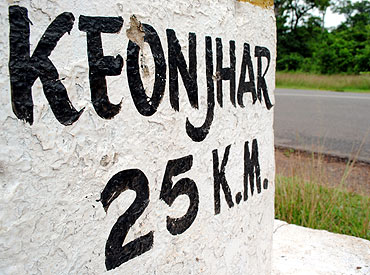
Sundhi was fast growing within the party's rank and fi#8804 so much so that within months he was handpicked to become an area commander. "I was smart, efficient and able to lead a squad of 15-20 cadres assigned to me. I was performing much better than Bhaskar Patra, and Susheel was observing my work. Soon they decided to promote me as the area commander of the Simlipal squad," he recalls.
On the morning of August 31, 2007, Sundhi and two other cadres -- one male and one female -- took charge as area commanders after a brief swearing-in ceremony which took place under the supervision of Susheel, the highest-ranking party member of their division, and three other committee members. Other rebels stood in a circle around Sundhi and the two others with their guns pointing down. The trio pledged their lifetime support to the party by reciting aloud, 'We will fight for the party for the rest of our lives and do every work that is assigned to us for the betterment of our country and betterment for our people. And never leave or betray the party.'
Thus, Sundhi was formally inducted as an area commander, a prestigious post within the CPI-Maoist, one of the 10 in its Kalinga Nagar division.
After this Sundhi was delegated fresh duties. He was now in charge of two party members and 15 other rebels. That was also the time he fell in love with Malti, who was in-charge of the women's wing in his dalam.
"And even though the men and women lived separately, we were attracted to each other," says a blushing Sundhi, who is now the father of a 2-year-old boy.
As per party requirements, Sundhi was to undertake attack or assault operations and expand the division. His instructions were to expand the squad's area of operation, and to destroy forest department establishments by destroying them or burning them.
"We were to attack the forest department and officials for two reasons, mainly. Firstly, because that would give us a safe base and, secondly, because they did not allow the tribals to enter the jungles, denying them their only source of livelihood possible," explains Sundhi.
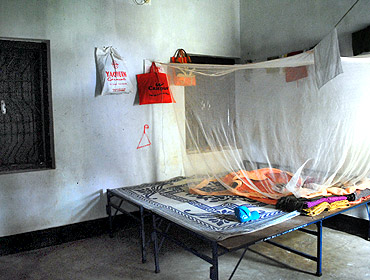
Sundhi now started moving undercover around the villages and interacting with tribal farmers, taking note of the problems they faced. He promised action and kept his promise too. Sundhi particularly remembers an incident when he brutally pumped 10 bullets from his AK-47 into an elephant, killing it.
Sundhi recounts, "Some locals had complained that the elephant was trampling and destroying their farms. They had complained to the forest department but nothing was being done about it. I reported this to Susheel who immediately ordered me to kill the animal. I was not scared as the elephant was tied and we fired at it from a distance."
After this incident he was given the nickname Hati (elephant).
Sundhi proved that he was ready for the next level by successfully co-ordinating and executing several such incidents of violence across his area of operation. His seniors then decided it was time to include him in big-ticket operations and send him out of Keonjhar. This was the time when the Maoists were short of weaponry but had manpower in abundance. So in January 2008, Sundhi was sent with a group for a special month-long training to prepare for 'Operation 22'.
Rigorous training for the operation culminated on February 15, 2008, when the rebels launched clinically co-ordinated attacks on the police establishments and the armoury in Nayagarh district. The attack resulted in the killing of 13 police personnel and one civilian and the looting of a huge cache of arms and ammunition.
Sundhi's job was to distract and engage the police personnel before the actual attacks were launched. Along with other rebels, Sundhi went on a motorcycle to conduct a reconnaissance of the selected targets.
"We were a three-member assault team and were supposed to engage the policemen for other comrades to launch a full-fledged attack. Shortly after we started firing, 35 of my party members came in a vehicle and took over the stations. We killed three officers, the rest were killed by the others," narrates Sundhi.
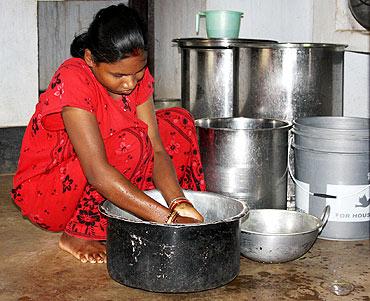
For Sundhi, the aim was clear: Kill the officers, and loot as many weapons as you can. There was no place for fear, or doubt.
"I was angry with the police. I was not scared. I had my AK-47 with me. If I did not fire on the policemen, they would have fired anyway. So I fired first, besides, an army of my own 35 people was also right behind me. Back then, during the attacks, my duty and aim were the only important things for me. My instructions were clear, kill the police and loot the weapons," he explains.
"At first we did not realise how many weapons we had picked up. We randomly picked up AK-47s, LMGs, Insas rifles and whatever else we found. We just looted as many as we possibly could. Within the party we had enough and more manpower but we were running short of weapons. The main purpose of this attack was to fill our armoury. For us the weapons were dearer to us than our lives," he narrates.
The memories of fleeing from the anti-Naxal forces after the success of Operation 22 are still fresh for Sundhi. As he recounts, "It was a choice between food and life. After the Nayagarh firing we travelled for three days without food, carrying the weapons and trying to reach the base. We were exhausted and were looking forward to some food. When we reached our base in Ghosima jungle, we saw that the food was all ready and placed in plates for us, but as we were about to settle down to eat, we were attacked by the anti-Naxal forces. We then started retaliating. I could see that the food was in front of me, all cooked and ready to eat, but I could not even touch it. There was constant exchange of fire. My friends were being killed. I was sad, but I had to save the weapons, otherwise that would defeat the whole purpose of our attack. So I continued firing. I had to choose between food and weapons. I chose the weapons."
Sundhi's only priority was to escape with the weapons. Finally, he, along with some fellow rebels, picked up as many arms as they could and went their separate ways. All the time co-ordinating on walkie-talkie sets, the group met deep in the jungles after a few hours.
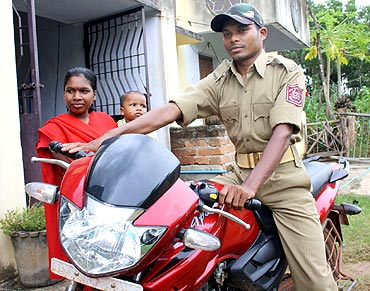
It was this incident that sowed the seeds of doubt about the party he had joined. He questioned his own actions; Sundhi felt his aim had gotten lost somewhere in the quagmire of violence. As one of the senior cadres he saw his seniors ill-treat tribal women. He had heard inspiring speeches from top Maoist cadres like Sabyasachi Panda, the top-ranking party member from Orissa, Basant alias Susheel and Prakash Dada of the Andhra Central Military Committee.
"But what was spoken and promised was completely different from what was being done. We were asked to join the party with some promises. Those were not fulfilled. We were told that the party will work for the development of the tribals. But all the work was destructive. On the contrary, we were indulging in atrocities on tribals, extorting food and money from them. If there was a development project underway in one of the tribal villages, then we would attack the workers and hamper the work. No work was being done for tribal development. I was highly agitated. I was not being paid money. There was no life. I was completely disillusioned with what I was doing," he says.
From his earlier trips to the villages, he had heard that the local SP was quite approachable and was trying to implement the state's surrender scheme in an attempt to encourage rebels to give up arms.
"One day Malti and I had gone to meet Susheel in Lakkhangarh. After meeting him, we seized the opportunity, left our arms and escaped in the dark of the night towards my village. We headed straight to my house and met my father," recalls Sundhi.
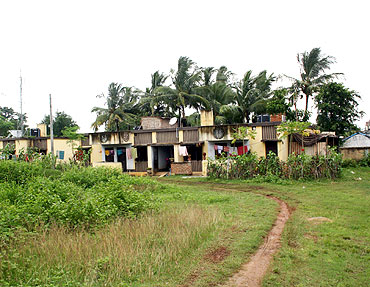
It was Sundhi's father who convinced him to surrender before Ashish Singh. "When I went to the SP I told him I want to surrender. He asked me what my rank was and if I was being forced to surrender or doing it on my free will. I informed him that I was an area commander. He was very happy to hear my post," informs Sundhi.
For Ashish Singh, the surrender of a Naxal area commander was proof that the scheme was achieving its purpose. After interrogating Sundhi and convincing himself of his genuineness, Singh ensured Sundhi's case got all the requisite approvals by the screening committee to ensure his rehabilitation. It was Singh who got him formally married to Malti, days after surrendering.
"Sundhi was completely frustrated with the Maoist way and violence which is why he decided to give up arms. He was genuinely repentant for what he had done. He wanted to start afresh. We found him fit for a home guard job and gave him one. However, he continues to get threats and hence he cannot venture out to faraway areas. One of the things we promise when a rebel chooses to surrender is the security of his life," says Singh.
Sundhi is currently facing legal trials for as many as seven self-confessed heinous crimes. As a part of the surrender scheme, the police have requested the government to withdraw all the cases, but a final decision is awaited on that request. Meanwhile, the government has also cleared his interest free loan of Rs 2 lakh to enable Sundhi to set up a small business which he can run alongside his job as a home guard.
Sundhi adds on a sombre note, "Earlier, on August 15, we used to hoist black flags and pledge to overthrow the Indian government. But now, after coming here, I realise what true freedom is. I had not even thought that one day I would be working in the home guards and serving the nation. I cannot stop people from joining (the Naxal movement). But I would like to appeal to those who are going there, please don't go. We have been there, done that, and it's not a right life."